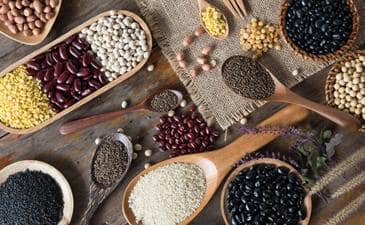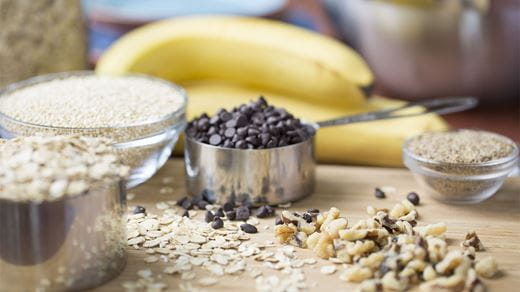But you don’t just have to take my word for it. In fact, a recent study from Harvard University and scientists at Unilever found that plant-based eating potentially offers some important advantages1.
Still, even as my clients show growing interest in the benefits of plant-based eating, some have also shared their misconceptions about making the shift. Here are the three most common misconceptions I hear from my clients, and how I respond to them.
Misconception #1 "I won't get enough iron or protein on a plant-based diet"
Reality: Iron and protein are more readily found in animal foods, but there are still sources of both in plant-based foods. With some simple planning, you can definitely get enough of these nutrients in your diet.
Here’s an easy technique I share with my clients: aim to have two servings of these protein and iron rich foods (I call them “plant-based superfoods”) at each meal and one serving at each snack. That way, you can meet your iron and protein needs without having to track everything you eat.

- Tofu (4 oz)
- Tempeh (4 oz)
- Beans (1/2 cup)
- Lentils (1/2 cup)
- Edamame (1/2 cup)
- Nuts (1/4 cup)
- Seeds (1/4 cup)
Misconception #2: "I can't eat a plant-based diet on a budget"
Reality: It’s simply not true that eating a plant-based diet is expensive. If you stick to unprocessed, plant-based foods, you can actually save money. Some processed vegan foods, such as mock meat slices, can be costly but if you use ingredients like legumes and tofu for your protein, you will likely only spend a few dollars on a meal that will yield multiple servings.
You also don’t need to necessarily buy all of your produce fresh. Save money by purchasing frozen fruits and veggies instead. Also, try shopping at bulk food stores to stock up on the spices, legumes, nuts, seeds and grains that you need, for less.
Misconception #3: "I'll gain weight on a plant-based diet because of all the carbs"
Reality: It is possible to gain weight when you eat a diet that is high in processed carbohydrates and low in fat and protein. That’s because your blood sugar will be spiking more often, which can lead you to feel more hungry and lethargic throughout the day.
However, there are way to prevent this. Try these tips:
- Consume lots of fibre-rich fruits, veggies, grains, legumes, nuts and seeds. Skip the processed junk food!
- Centre your meals around protein-rich foods like those listed above. Remember to have two of those "plant-based superfoods" at each meal.
- Add in more fat! Fat can keep us full for longer, supports our metabolism and helps us absorb various nutrients. My favourite fats are from avocados, nuts and seeds. I also like to cook with Becel Avo™ Plus, because it has a high smoke point – 455 degrees Fahrenheit – so it doesn’t break down while cooking. It’s also a source of plant-based omega-3 polyunsaturated fats.
Getting started with plant-based eating – and staying healthy while doing it – isn’t difficult. There are plenty of simple, delicious recipes available at your fingertips, so get on your way to adopting a plant-based diet today!
About Nicole:
Nicole Osinga is a registered dietitian with a private practice in Durham Region, just outside of Toronto, Ontario and a spokesperson for Becel. She brings a fresh, evidence-based perspective, while working towards practical nutrition solutions with her clients. Nicole has a busy and dynamic professional life. Along with spending her time coaching clients to help them meet their weight and health goals, she also regularly appears in the media and delivers dynamic group presentations. She encourages her clients and audiences to eat real, whole foods, and mostly plants. She teaches the concepts of nourishment instead of restriction, mindful eating, meal planning and meal prep.




